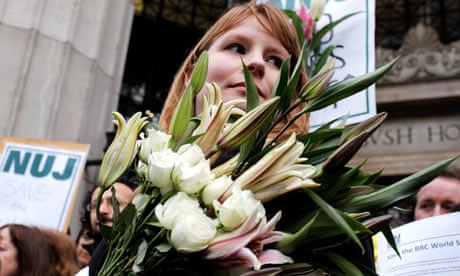An influential cross-party committee of MPs has called for the cuts to the BBC's World Service to be reversed to protect its global reputation.
The Commons foreign affairs select committee said the 16% budget cut imposed on the service as part of the government's comprehensive spending review had "long-term ramifications" for the 79-year-old broadcaster and called for its future funding to be ringfenced.
MPs on the committee called for the World Service budget to be protected to "prevent any risk of long-term erosion of the World Service's funding and of parliament's right to oversee its work".
They also questioned whether the government's decision to shift responsibility for funding the World Service from the Foreign Office to the BBC licence fee by 2014 would make its budget more secure.
"The BBC World Service has been described by Kofi Annan as 'perhaps Britain's greatest gift to the world'. The value of the World Service in promoting the UK across the globe, by providing a widely respected and trusted news service, far outweighs its relatively small cost," said Richard Ottaway, the Conservative MP and committee chairman.
"The recent dramatic events in north Africa and the Middle East have shown that the 'soft power' wielded through the World Service could bring even more benefits to the UK in the future than it has in the past, and that to proceed with the planned cuts to the World Service would be a false economy."
The cost savings announced by the BBC in January following the government-imposed budget cut included the axing of five foreign language services and a wholesale retreat from shortwave radio in an attempt to reduce the World Service budget by £46m a year.
These changes, which led to outrage from staff and trade unions, will lead to the loss of around 650 jobs, out of a workforce of 2,400, and about 30 million listeners from a worldwide audience of 180 million.
The foreign affairs committee said these cuts should be reversed, with the World Service budget maintained at about the current level of £253m a year.
If the funding cuts do go ahead, the committee called for "damage limitation", asking for money to be found to maintain broadcasts of the Hindi and Mandarin services, which are both due to close. MPs also recommended that more resources be made available to BBC Arabic.
The foreign secretary, William Hague, responding to the committee's report, said: "The BBC World Service performs an invaluable role, reflecting British democratic values overseas and supporting British influence in the world.
"However, in line with all other publicly funded bodies, it must play its part in reducing the deficit. We have spent many months working with the BBC World Service to make sure the budget reductions are manageable and the BBC has been clear that the transfer of funds from the licence fee in 2014/15 will not make the World Service's funding less secure."
The corporation has already reversed some of the proposed World Service cuts in the Arabic region and given its Hindi service a stay of execution while it looks for a private partner to run it full-time.
Helen Boaden, the BBC's director of news,
told a Voice of the Listener and Viewer conference in central London that the BBC was "absolutely committed to protecting the World Service" and would be "fleet of foot and adapt to changing circumstances".
But she warned: "There isn't significant room for further flexibility within the resources we have available."
Mark Thompson, the BBC director general, has indicated he will increase the World Service budget when the corporation takes over responsibility for its funding in three years' time.
The committee's findings were echoed by the National Union of Journalists, whose general secretary, Jeremy Dear, said: "The damaging service closures already implemented must be reversed immediately to protect the World Service as a source of information for people across the world.
"The committee report is acidly polite in pointing out that there is a 'discrepancy between the relatively small amounts of money needed to avoid the most damaging cuts to the World Service and the scale of the Department for International Development spending review settlement'."
"The attempt to cut the BBC World Service has inspired a level of international protest which echoes everything that BBC journalists have said about their concern for the service they provide.
"The report shows that the cutters have got it badly wrong in attacking the BBC World Service. This report is an opportunity to reverse that disastrous policy."
David Liddiment, a member of the BBC Trust, said it was still working out how it would oversee the World Service when it comes under the BBC's auspice in 2014.
"Once the BBC takes over responsibility for the World Service's finances which it will do from 2014 then it becomes a part of the BBC in a direct sense and the BBC will be accountable for its quality and distinctiveness," he said. "The precise governance structure has not yet been worked out."

Comments (…)
Sign in or create your Guardian account to join the discussion